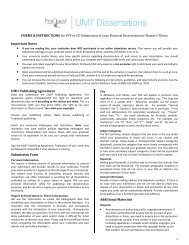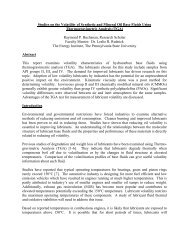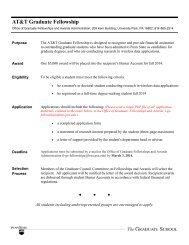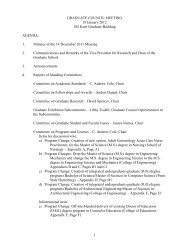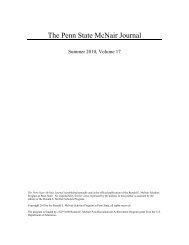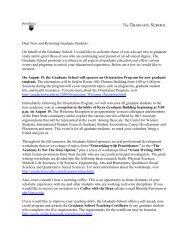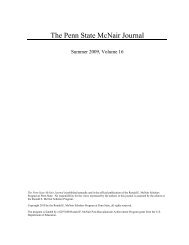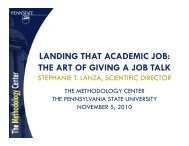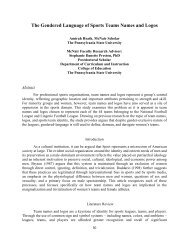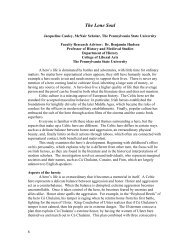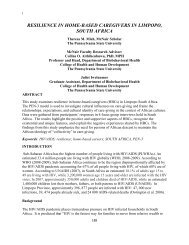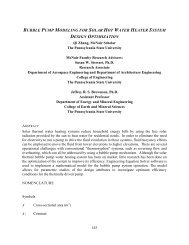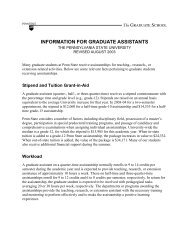1 GRADUATE COUNCIL MEETING 9 May 2012 102 Kern Graduate ...
1 GRADUATE COUNCIL MEETING 9 May 2012 102 Kern Graduate ...
1 GRADUATE COUNCIL MEETING 9 May 2012 102 Kern Graduate ...
Create successful ePaper yourself
Turn your PDF publications into a flip-book with our unique Google optimized e-Paper software.
J14<br />
*SOC/AFR 527- Migration, Urbanization and Policy in the Developing World (3)<br />
The course reviews the conceptual, substantive, and policy issues associated with migration and<br />
urbanization in non-western contexts. It begins by focusing attention on the role of migration<br />
systems in the organization of migration flows. Emerging issues, controversies, and the impacts<br />
of social changes in rural and urban areas in migration will also be reviewed. The course also<br />
gives attention to the determinants of internal-migration and urbanization in the developing<br />
world. Finally, using discourses on population policy as a backdrop, the implications of<br />
migration and urbanization trends for policy development will be evaluated.<br />
AAAS 530- Globalization in Africa (3)<br />
This course examines how globalization has impacted African societies and their socioeconomic<br />
development. To be able to systematically examine its impacts, students first need a clear<br />
conceptualization of globalization and its essential characteristics. The course, thus, starts with a<br />
conceptualization of globalization and a theoretical discussion about how and under what<br />
conditions it emerges. The course then analyzes globalization’s impacts on Africa’s<br />
socioeconomic development and concludes with a discussion that explores how African<br />
countries may deal with the most important challenges and constraints globalization imposes on<br />
them.<br />
*AFR/GEOG 532- Environment and Poverty in Africa (3)<br />
This seminar is used to critique overlaps among resource control, conservation, and poverty in<br />
sub-Saharan Africa. The readings, discussions, annotations and critiques will be designed to<br />
draw out what is believed to be an overlapping conceptual framework between sustainability and<br />
poverty. The seminar will also use case study examples to trace the relationships between<br />
sustainability discourse (in terms of conservation) and poverty creation and perpetuation among<br />
livelihood systems in sub-Saharan Africa, for example: nomadic pastoralists and land and water<br />
resources; land reform and rural livelihood systems; community-based resource programs,<br />
mining, the environment and rural communities; and national parks, transfrontier parks and rural<br />
livelihood systems.<br />
*AFR/PL SC 534- Political Economy of Petroleum, Energy and Extractive Industries in Africa<br />
(3)<br />
This course examines the extractive industry-driven changes in Africa’s political economy as<br />
well as in the continent’s foreign relations. Students are encouraged to examine the institutional<br />
mechanisms under which the expansion of the industry is taking place in Africa. The course,<br />
thus, involves an extensive discussion of the institutional characteristics of Africa, including<br />
issues of land tenure and property rights laws. It examines how the institutional mechanisms are<br />
changing in order to facilitate the industry’s expansion and the repercussions of these<br />
institutional changes on society. The course also analyzes the industry’s impacts on Africa’s<br />
socioeconomic development and global relations.<br />
*AFR 536- Kinship and Social Practices in Africa (3)<br />
The course analyses different kinship theories and how they may enable us to enhance our<br />
understanding of the different dimensions of African social practices in historical and<br />
contemporary Africa. It examines theories of kinship and social formations in order to interpret



